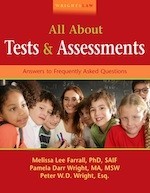In This Issue ...
Circulation: 98,627
ISSN: 1538-320
April 7, 2015

Register for a Wrightslaw Training Today!
|
 Thousands of people - parents and teachers - write to us every year with questions about how to write IEPs. Why is writing IEPs so difficult? What makes the IEP process so confusing? Thousands of people - parents and teachers - write to us every year with questions about how to write IEPs. Why is writing IEPs so difficult? What makes the IEP process so confusing?
Last week, you may have been surprised to learn that writing SMART IEPs is not very difficul. IEPs should:
- include a plan to meet all of your child's unique needs
- tell you exactly what the school will do to address your child’s needs.
- give you a way to know if the IEP (educational plan) is working
In this issue of the Special Ed Advocate you learn that good IEPs have specific goals and objectives. They include clear descriptions of the knowledge and skills that will be taught and how your child’s progress will be measured.
Please don't hesitate to forward this issue to friends, family members, or colleagues.
  
|

|
Requirements for IEPs
Q: What can you do if the school wants to measure progress by "teacher observations" or "teacher made tests," not objective tests of academic achievement and functional performance?
A: Read an interview with Pete and Pam Wright, SMART IEPs: A Tactics and Strategy Session. You will learn more about...
- your parent role
- getting SMART goals in your child's IEP
- requirements for measurable academic and functional goals
- measuring progress
- accommodations and modifications
|

|
A Special Thanks to Our Sponsors
This issue of the Special Ed Advocate is brought to you by Lindamood-Bell Learning Centers.
To meet other Wrightslaw sponsors, visit the Yellow Pages for Kids! You will also find listings for advocates and attorneys, evaluators, educational consultants, psychologists, educational diagnosticians, and more...
Find out how to become a sponsor.
|








 Thousands of people - parents and teachers - write to us every year with questions about how to write IEPs. Why is writing IEPs so difficult? What makes the IEP process so confusing?
Thousands of people - parents and teachers - write to us every year with questions about how to write IEPs. Why is writing IEPs so difficult? What makes the IEP process so confusing? 







